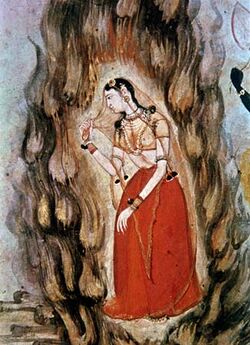Social:Agnipravesham
From HandWiki
Short description: Practice in Hindu mythology
Agnipravesham (Sanskrit: अग्निप्रवेशम, romanized: Agnipraveśam, lit. 'Fiery entrance'),[1] also called Agnipariksha (Sanskrit: अग्निपरीक्षा, romanized: Agniparīkṣā, lit. 'fiery ordeal') is the mythical[2] practice of self-immolation described in Hindu literature.[3][4] It is primarily associated with the ordeal of Sita in the Ramayana, and is regarded to be a custom inspired by Vedic tradition.[5]
Legend
In the last book of the Ramayana, Sita undergoes the agnipravesham to offer evidence of her purity to her husband, Rama, and the people of Ayodhya, after suspicions are cast upon her virtue due to her abduction by Ravana.[6][7][8] She invokes Agni, the god of fire, who rescues her, thereby testifying to her fidelity to Rama.[9]
See also
- Ramayana
- Trial by ordeal
- Sati
References
- ↑ www.wisdomlib.org (2017-08-29). "Agnipravesha, Agnipraveśa, Agni-pravesha: 11 definitions" (in en). https://www.wisdomlib.org/definition/agnipravesha.
- ↑ Joshi, Vivek Vishnupant (2018) (in en). History, Myth & Folktales in the Plays of Girish Karnad. Lulu.com. p. 142. ISBN 978-1387735457. https://books.google.com/books?id=gqlXDwAAQBAJ&dq=agnipariksha+ordeal&pg=PT142.
- ↑ Dalal, Roshen (2014). Hinduism: an Alphabetical Guide. London: Penguin Books. ISBN 978-8184752779. OCLC 1132344222. https://www.worldcat.org/oclc/1132344222.
- ↑ Muralidharan, Kavitha. "With just 11 stories this collection goes to the core of Tamil writer Jayakanthan's fiction" (in en-US). https://scroll.in/article/856588/with-just-11-stories-this-collection-goes-to-the-core-of-tamil-writer-jayakanthans-fiction.
- ↑ Herman, Phyllis K.; Shimkhada, Deepak (2009) (in en). The Constant and Changing Faces of the Goddess: Goddess Traditions of Asia. Cambridge Scholars Publishing. p. 62. ISBN 978-1443807029. https://books.google.com/books?id=97EYBwAAQBAJ&dq=agnipariksha+ordeal&pg=PA62.
- ↑ Parimoo, Ratan (1986) (in en). Vaiṣṇavism in Indian Arts and Culture: Collected Papers of the University Grants Commission National Seminar on "Impact of Vaiṣṇavism on the Indian Arts". Books & Books. pp. 446. ISBN 978-8185016184. https://books.google.com/books?id=CckrAAAAMAAJ&q=agnipravesham+sita.
- ↑ Patra, Dr Dipankar; Banerjee, Subhashis; Doley, Abani; Chatterjee, Biswarup; Karmakar, Sharmistha; Kamsi, Zenny (2021) (in en). Interface a National Research Anthology on Indigenous Language, Literature & Culture. Book Rivers. p. 300. ISBN 978-9391000219. https://books.google.com/books?id=F01WEAAAQBAJ&dq=agnipariksha+sita&pg=PA300.
- ↑ Kishwar, Madhu Purnima (2008) (in en). Zealous Reformers, Deadly Laws. Sage Publications India. pp. 127. ISBN 978-8132100096. https://books.google.com/books?id=5rSGAwAAQBAJ&dq=agnipariksha+ordeal&pg=PA127.
- ↑ Naidu, Vayu (2012) (in en). Sita's Ascent. Penguin UK. pp. 18. ISBN 978-8184757712. https://books.google.com/books?id=LIHYVC3fLRoC&dq=agnipariksha+sita&pg=PT18.
 |


